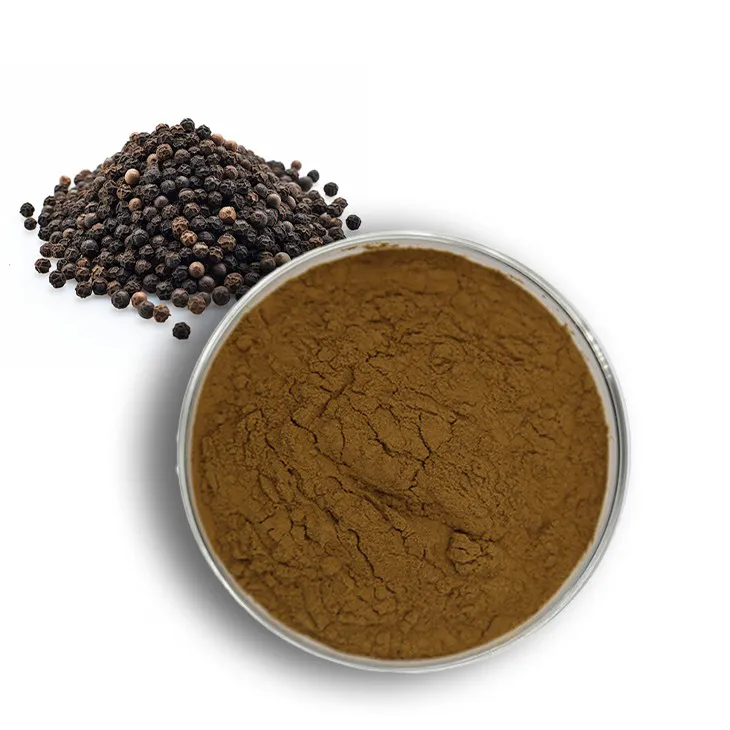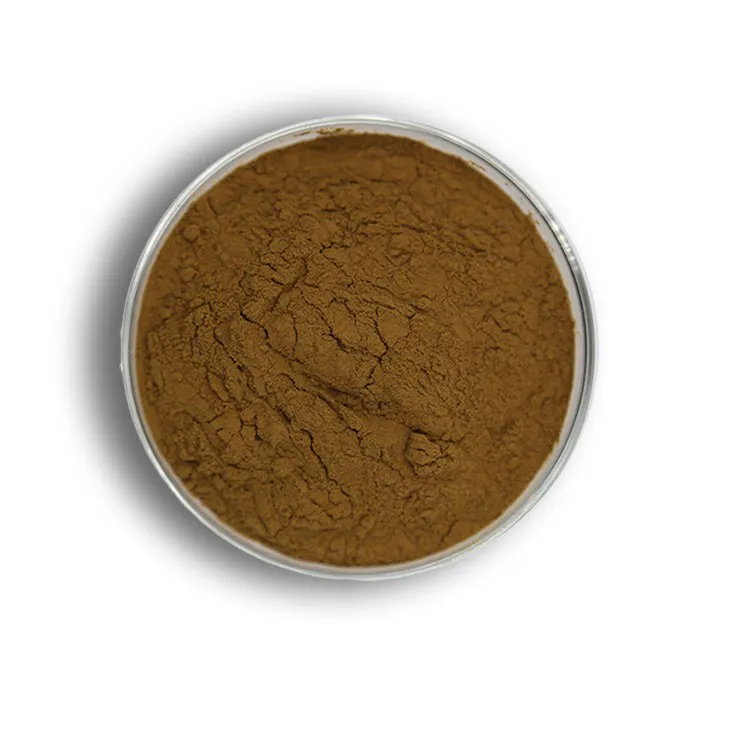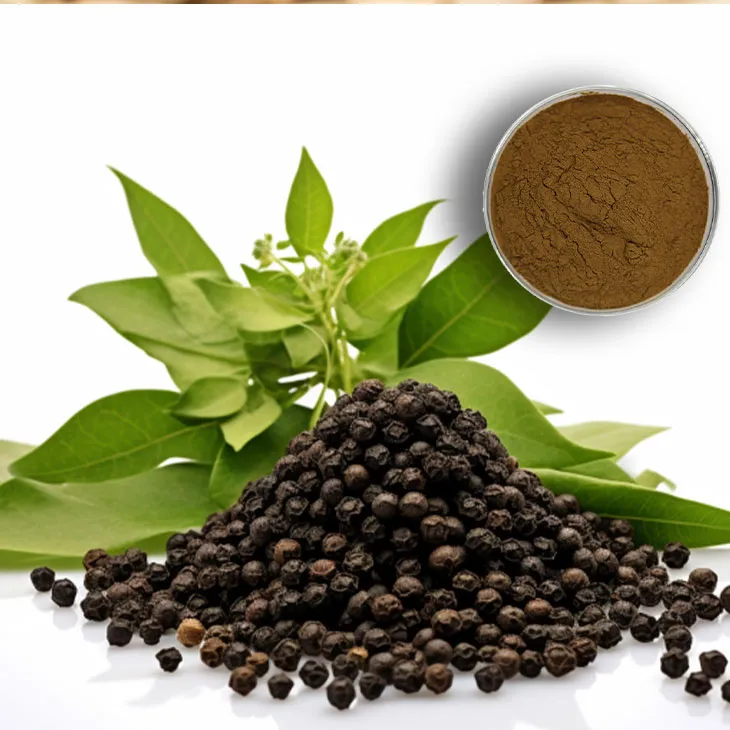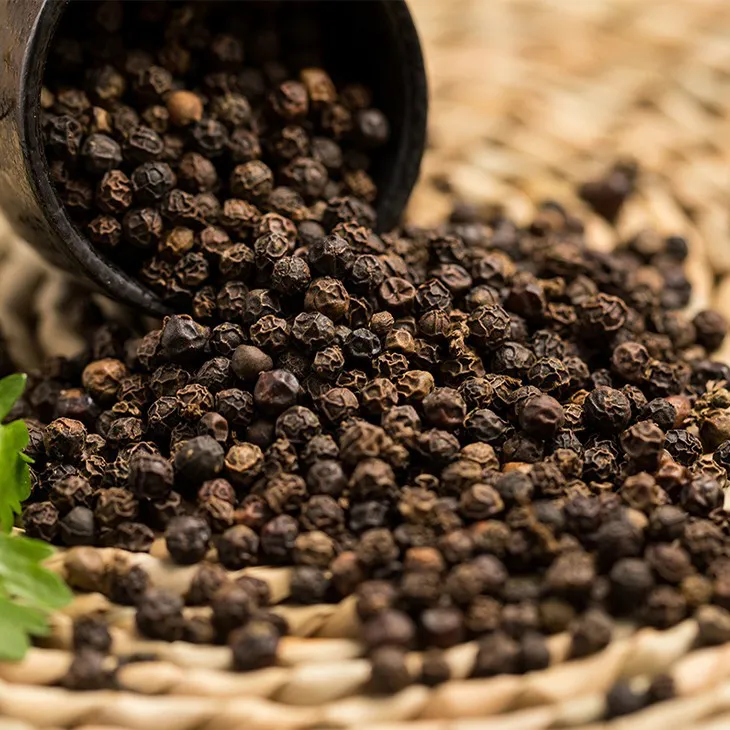- 0086-571-85302990
- sales@greenskybio.com
Spicing Up the Future: A Comprehensive Conclusion on Black Pepper Extract's Role in Plant Health
2024-07-22

1. Introduction
Plants are the foundation of life on Earth, providing food, oxygen, and numerous ecological services. Ensuring their health is of utmost importance. In recent years, natural products have gained significant attention in the field of plant health, and Black Pepper Extract is one such product that has shown great promise. Black pepper (Piper nigrum), a common spice in our kitchens, has been found to possess properties that can enhance plant growth and protect against diseases. This article aims to comprehensively conclude the role of Black Pepper Extract in plant health.

2. Chemical Composition of Black Pepper Extract
The beneficial effects of black pepper extract in plant health can be attributed to its rich chemical composition. Black pepper contains a variety of bioactive compounds, including:
- Piperine: This is the most abundant alkaloid in black pepper. Piperine has been shown to have antioxidant, anti - inflammatory, and antimicrobial properties. In plants, it may play a role in enhancing the plant's defense mechanisms against pathogens.
- Essential oils: Black pepper essential oils contain compounds such as limonene, β - caryophyllene, and sabinene. These essential oils can have insecticidal and fungicidal properties, protecting plants from insect pests and fungal diseases.
- Flavonoids: Flavonoids in black pepper extract contribute to its antioxidant activity. They can scavenge free radicals in plants, reducing oxidative stress and promoting plant growth.

3. Role in Plant Growth
3.1. Seed Germination
Black pepper extract can have a positive impact on seed germination. The bioactive compounds in the extract can break seed dormancy and stimulate the germination process. For example, piperine has been shown to increase the activity of enzymes involved in seed germination, such as amylase. This enzyme breaks down starch in the seed into simple sugars, providing energy for the emerging seedling. Additionally, the antioxidant properties of the extract can protect the embryonic tissue in the seed from oxidative damage during germination.
3.2. Root Development
Healthy root development is crucial for plant growth, as roots are responsible for water and nutrient uptake. Black pepper extract can enhance root growth in several ways. Firstly, it can stimulate the production of root - specific hormones, such as auxins. These hormones promote cell elongation in the roots, leading to longer and more branched roots. Secondly, the antimicrobial properties of the extract can protect the roots from soil - borne pathogens, which can otherwise inhibit root growth. For instance, the essential oils in black pepper extract can inhibit the growth of fungi like Fusarium and Rhizoctonia, which are known to cause root rot diseases.
3.3. Shoot Growth
The application of black pepper extract can also promote shoot growth. By reducing oxidative stress in the plant cells, the flavonoids in the extract allow for better cell division and elongation in the shoots. This results in taller and more vigorous plants. Moreover, the anti - inflammatory properties of piperine may help in reducing any internal stress factors in the plant that could otherwise impede shoot growth. The extract can also enhance the uptake of nutrients, such as nitrogen and phosphorus, which are essential for shoot development.

4. Role in Disease Resistance
4.1. Antifungal Activity
Black pepper extract has significant antifungal activity. As mentioned earlier, the essential oils and piperine in the extract can inhibit the growth of various fungal pathogens. Fungal diseases can cause severe damage to plants, reducing crop yields. For example, black pepper extract has been shown to be effective against Botrytis cinerea, a common fungal pathogen that affects a wide range of plants. The extract can disrupt the cell membrane of the fungus, leading to leakage of cellular contents and ultimately cell death. This antifungal activity can be a valuable asset in organic farming, where the use of synthetic fungicides is often restricted.
4.2. Antibacterial Activity
In addition to its antifungal properties, black pepper extract also exhibits antibacterial activity. Some bacteria can cause diseases in plants, such as Pseudomonas syringae, which can cause leaf spots and blights. The bioactive compounds in black pepper extract can interfere with the bacterial cell wall synthesis or disrupt the bacterial cell membrane, thereby killing or inhibiting the growth of these bacteria. This antibacterial activity can help in maintaining plant health, especially in greenhouse environments where bacterial diseases can spread rapidly.
4.3. Inducing Systemic Resistance
Black pepper extract can also induce systemic resistance in plants. When plants are treated with the extract, they can activate their own defense mechanisms against a wide range of pathogens. This is achieved through the activation of various defense - related genes in the plant. For example, the extract can trigger the production of pathogenesis - related (PR) proteins, which play a role in recognizing and responding to pathogen attacks. By inducing systemic resistance, black pepper extract can provide long - term protection to plants against diseases, even in the absence of direct contact with the pathogen.

5. Interaction with Beneficial Microorganisms
Plants interact with a variety of beneficial microorganisms in the soil, such as mycorrhizal fungi and nitrogen - fixing bacteria. Black pepper extract can influence these interactions in a positive way. The antimicrobial properties of the extract can selectively inhibit the growth of harmful microorganisms, while leaving the beneficial ones unharmed. For example, it can prevent the overgrowth of pathogenic fungi that may compete with mycorrhizal fungi for resources. At the same time, the extract may also stimulate the growth and activity of beneficial microorganisms. Some studies have suggested that the bioactive compounds in black pepper extract can enhance the ability of nitrogen - fixing bacteria to fix nitrogen, thereby increasing the availability of nitrogen for plants.
6. Application Methods
6.1. Foliar Spray
Foliar spraying is a common method of applying black pepper extract to plants. The extract is diluted in water and sprayed onto the leaves of the plants. This method allows for quick absorption of the bioactive compounds by the plant leaves. When spraying, it is important to ensure that the entire leaf surface is covered evenly. Foliar sprays are often used for providing a quick boost to plant health, especially in cases of nutrient deficiencies or disease outbreaks.
6.2. Soil Drench
Soil drenching involves pouring the diluted black pepper extract solution directly onto the soil around the plant roots. This method is beneficial for improving root health, as the extract can reach the roots directly. It can also help in suppressing soil - borne pathogens in the root zone. Soil drenching is usually done at regular intervals to maintain a continuous supply of the bioactive compounds in the soil.
6.3. Seed Treatment
Seed treatment with black pepper extract can improve seed germination and protect the emerging seedlings from diseases. The seeds are soaked in a diluted extract solution for a specific period of time before sowing. This pre - treatment can enhance the seed's resistance to pathogens and environmental stresses, resulting in better seedling establishment.
7. Considerations and Limitations
7.1. Concentration
The concentration of black pepper extract used is crucial. Too high a concentration may have phytotoxic effects on plants, causing damage to plant tissues. On the other hand, too low a concentration may not be effective in promoting plant growth or providing disease resistance. Therefore, it is necessary to determine the optimal concentration for different plant species through experimentation.
7.2. Compatibility
When using black pepper extract in combination with other plant protection products or fertilizers, compatibility issues need to be considered. Some chemical compounds may interact with the bioactive components of the extract, reducing its effectiveness. It is important to test the compatibility of black pepper extract with other products before application.
7.3. Environmental Factors
Environmental factors such as temperature, humidity, and sunlight can also influence the effectiveness of black pepper extract. For example, high temperatures may cause the volatilization of the essential oils in the extract, reducing their availability for plant uptake. Similarly, excessive rainfall can wash away the foliar - sprayed extract, necessitating re - application.
8. Conclusion
Black pepper extract has emerged as a promising natural product for enhancing plant health. Its diverse chemical composition endows it with multiple beneficial properties, including promoting plant growth and providing disease resistance. Through its effects on seed germination, root and shoot development, and induction of systemic resistance, black pepper extract can significantly improve plant health. Moreover, its positive interaction with beneficial microorganisms further enhances its role in plant health. However, proper consideration of application methods, concentration, compatibility, and environmental factors is essential to fully realize its potential. With further research and development, black pepper extract could revolutionize plant care, offering a sustainable and natural alternative to synthetic plant protection products.
FAQ:
What are the main components in black pepper extract that contribute to plant health?
Black pepper extract contains various bioactive compounds such as piperine. Piperine has been shown to have antioxidant properties which can help plants combat oxidative stress. It may also play a role in enhancing the plant's own defense mechanisms against pathogens, though the exact mechanisms of how all the components work together are still being studied.
How does black pepper extract enhance plant growth?
Black pepper extract can enhance plant growth in multiple ways. It may improve nutrient uptake in plants. For example, it could potentially affect the permeability of plant cell membranes, allowing for better absorption of essential nutrients like nitrogen, phosphorus, and potassium. Additionally, it might stimulate the production of growth - promoting hormones in plants, which in turn can lead to increased cell division and elongation, resulting in better overall growth.
Can black pepper extract be used as a natural alternative to chemical pesticides for disease resistance in plants?
Yes, it has the potential to be used as a natural alternative. The bioactive compounds in black pepper extract can trigger the plant's natural defense responses against diseases. It can enhance the plant's immune system so that it is better able to resist attacks from pathogens such as fungi, bacteria, and viruses. However, more research is needed to fully understand its effectiveness compared to chemical pesticides and to develop proper application methods.
What is the optimal concentration of black pepper extract for promoting plant health?
The optimal concentration can vary depending on the plant species, growth stage, and environmental conditions. In general, lower concentrations may be used as a growth stimulant, while slightly higher concentrations might be more effective for disease resistance. However, excessive concentrations could potentially be harmful to plants. Preliminary research suggests that concentrations in the range of 0.1% - 1% might be beneficial for most common plants, but this needs further investigation on a case - by - case basis.
How is black pepper extract applied to plants?
Black pepper extract can be applied in several ways. It can be sprayed directly onto the foliage of plants, making sure to cover both the upper and lower surfaces of the leaves. This allows the plants to absorb the beneficial compounds. It can also be applied to the soil around the plants. When applied to the soil, it may interact with the soil microorganisms and root systems of plants, gradually releasing its beneficial effects. In some cases, it can be added to the plant's watering solution for a more even distribution.
Related literature
- The Role of Natural Extracts in Plant Health: Focus on Black Pepper"
- "Bioactive Compounds in Black Pepper Extract and Their Impact on Plant Growth and Defense"
- "Black Pepper Extract: A Promising Natural Agent for Sustainable Plant Care"
- ▶ Hesperidin
- ▶ citrus bioflavonoids
- ▶ plant extract
- ▶ lycopene
- ▶ Diosmin
- ▶ Grape seed extract
- ▶ Sea buckthorn Juice Powder
- ▶ Beetroot powder
- ▶ Hops Extract
- ▶ Artichoke Extract
- ▶ Reishi mushroom extract
- ▶ Astaxanthin
- ▶ Green Tea Extract
- ▶ Curcumin Extract
- ▶ Horse Chestnut Extract
- ▶ Other Problems
- ▶ Boswellia Serrata Extract
- ▶ Resveratrol Extract
- ▶ Marigold Extract
- ▶ Grape Leaf Extract
- ▶ blog3
-
Oat Straw Extract Powder
2024-07-22
-
Hesperidin
2024-07-22
-
Tamarind extract powder
2024-07-22
-
Troxerutin
2024-07-22
-
Almond Extract Powder
2024-07-22
-
Nutmeg Extract
2024-07-22
-
Saw Palmetto Extract
2024-07-22
-
Tongkat Ali Extract Powder
2024-07-22
-
Aminolevulinic acid
2024-07-22
-
Fig Extract
2024-07-22





















